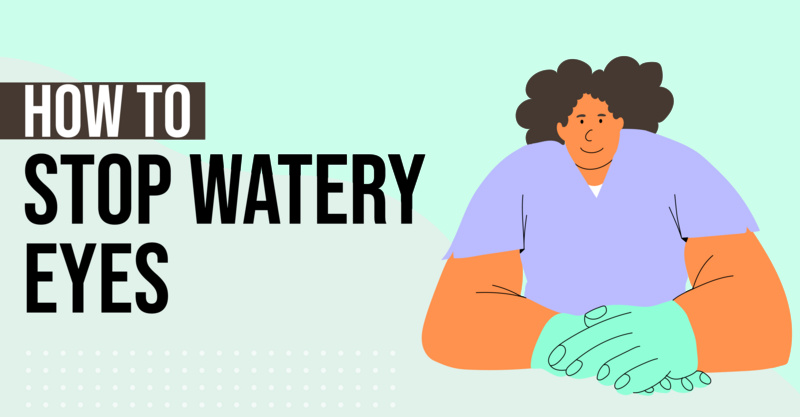Key Points
- The primary causes of watery eyes include irritants like dust, pollen, smoke, and animal dander, eye injuries, and upper respiratory infections.
- Several health conditions can also lead to watery eyes, such as allergies, corneal abrasion, concussion, conjunctivitis, and sinusitis.
- Allergies may cause additional symptoms like itchy eyes, runny nose, sneezing, and congestion.
- Corneal abrasion, often from sharp objects, can cause eye pain and potential future vision issues if not treated.
- The article provides a list of questions your doctor may ask to diagnose the cause of your watery eyes.
What Causes Watery Eyes?
Watery eyes, also called epiphora, can be caused by a multitude of things, from allergies to viruses. Here are the most common reasons for watery eyes, according to the Mayo Clinic:
Dry eyes
Dry eyes occur when the eyes do not produce enough tears or when the tears evaporate too quickly. This can lead to discomfort, irritation, and a gritty sensation in the eyes, according to the Mayo Clinic. They note that the common causes of dry eyes include aging, certain medications, environmental factors, and medical conditions. Management may involve using eye drops like artificial tears, avoiding dry or windy environments, and addressing any underlying health issues.
Pinkeye (Conjunctivitis)
Pinkeye, also known as conjunctivitis, is an inflammation of the thin, transparent layer of tissue that lines the inner surface of the eyelid and covers the white part of the eye. It can be caused by viruses, bacteria, or allergens, leading to symptoms such as redness, itching, tearing, and discharge, according to the Mayo Clinic. They note that treatment for pinkeye may involve antibiotic or antiviral eye drops, cold compresses, and practicing good hygiene to prevent the spread of infection.
Allergies
Irritants such as dust, pollen, animal dander, and smoke can cause watery eyes, according to the Mayo Clinic. Poor air quality or high levels of allergens in the air can sometimes make your eyes sore or itchy, according to the Mayo Clinic.
Eyelid problems
Eyelid problems can encompass a range of conditions, including styes, eye twitches, blepharitis, ptosis, and eyelid inflammation, according to the Mayo Clinic. These issues can cause discomfort, swelling, redness, and in some cases, affect vision. They note that treatment may involve warm compresses, antibiotic ointments, or surgical intervention, depending on the specific eyelid problem.
Scratch on the Eye
A scratch or abrasion to the eye area often causes your eyes to water, according to the Mayo Clinic. Injuries to the head or eyes can also cause vision problems, such as blurry vision. These injuries sometimes cause serious medical complications.
Styes
Styes are red, painful lumps that can develop on the eyelid, typically caused by a bacterial infection of an oil gland, according to the Mayo Clinic. They often appear as a swollen, pimple-like bump and may cause discomfort, tenderness, and redness. Treatment usually involves applying warm compresses to the affected area and, in some cases, antibiotic ointment or drainage by a healthcare professional, according to the Mayo Clinic.
Eyelash problems
Ingrown eyelashes can cause irritation and discomfort. Treatment may involve proper grooming techniques, topical medications, or, in severe cases, surgical intervention, according to the Mayo Clinic.
Blepharitis
Blepharitis is a chronic condition that causes inflammation of the eyelids — typically at the base of the eyelashes. The Mayo Clinic notes that it can cause redness, itching, irritation, and a gritty sensation in the eyes. They note that this condition may be linked to bacterial overgrowth, skin conditions, or eyelid gland dysfunction. Management often involves gentle cleansing of the eyelids, warm compresses, and sometimes antibiotic ointments to alleviate symptoms and prevent flare-ups.
Illness
Viral or bacterial infections that affect your nose and throat can also cause watery eyes. These infections usually clear up on their own. If you have an infection, you might experience a sore throat, runny nose, sneezing, coughing, or a fever. You might notice that your eyes are especially watery when you cough or sneeze. Minor viral illnesses such as colds usually resolve within a week or so. See a doctor if your symptoms don’t improve. You may have a bacterial infection, which requires antibiotics.
When Should You Call a Doctor?
Watery eyes can be something simple that resolves quickly, or it can be a sign of something serious. The Mayo Clinic recommends that you see a doctor if you experience any of the following symptoms:
-
Vision loss or visual disturbances
-
Injured or scratched eye
-
Chemicals in your eye
-
Discharge or bleeding from your eye
-
A foreign object stuck in your eye on the inside of your eyelid
-
Red, irritated, swollen, or painful eyes
-
Unexplained bruising around your eye
-
Tenderness around your nose or sinuses
-
Eye issues accompanied by a severe headache
-
Watery eyes that fail to improve on their own
How Are Watery Eyes Treated?
Treatment for watery eyes will depend on the reason for the watery eyes and the severity of the condition. Common treatments noted by the Mayo Clinic include:
-
Prescription eye drops can help a variety of issues.
-
Treating allergies that make your eyes watery with over-the-counter antihistamines or prescription allergy medications.
-
Antibiotics if you have an eye infection.
-
A warm, wet towel placed on your eyes several times a day, can help with blocked tear ducts or a stye.
-
A surgical procedure to clear blocked tear ducts.
-
Surgery to repair or create a new tear drainage system (dacryocystorhinostomy).
Questions Your Doctor May Ask About Watery Eyes
When examining you to find the cause of your watery eyes, a doctor may ask the following questions:
-
When did your symptoms begin?
-
Have you experienced cold symptoms such as coughing or sneezing?
-
Have you noticed any pus or colored discharge from the eyes?
-
Did you recently scratch or injure your eye?
-
Does anyone in your family, workplace, or school have similar symptoms?
Watery Eyes May Also Be Known as
- Watering eye
- Epiphora
- Teary eyes
- Tearing
- Epiphora
- Epiphora
- Epiphora
Frequently asked questions
What additional symptoms might I experience if allergies are causing my watery eyes?
In addition to watery eyes, allergies can also cause symptoms such as itching, redness, swelling, and a burning sensation in the eyes, according to the Mayo Clinic. You may also experience sneezing, a runny or stuffy nose, and itching in the throat or roof of the mouth. Allergic reactions can vary in severity, and it's important to consult a healthcare professional for proper diagnosis and management.
Can a corneal abrasion cause watery eyes, and are there any potential future issues if it's not treated?
Yes, a corneal abrasion can cause watery eyes, along with symptoms such as pain, redness, sensitivity to light, and a foreign body sensation in the eye, according to the Mayo Clinic. If left untreated, a corneal abrasion can lead to complications such as infection, corneal scarring, and vision problems. It's crucial to seek prompt medical attention for proper evaluation and treatment to prevent potential future issues.
Solv has strict sourcing guidelines and relies on peer-reviewed studies, academic research institutions, and medical associations. We avoid using tertiary references.










